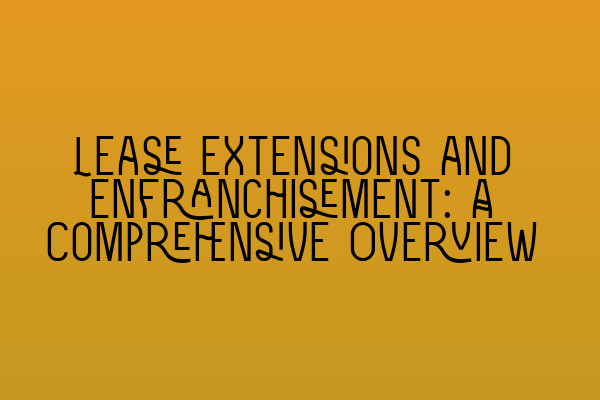Lease Extensions and Enfranchisement: A Comprehensive Overview
Welcome to the SQE Property Law & Land Law blog! In this post, we will provide you with a comprehensive overview of lease extensions and enfranchisement. Whether you are a property owner, a solicitor, or simply interested in property law, we will cover all the essential information you need to know.
Before we dive into the details, let’s briefly define lease extensions and enfranchisement. Lease extensions involve extending the length of a lease term, commonly seen in residential leases. Enfranchisement, on the other hand, refers to the process of acquiring the freehold interest in a leasehold property.
Now, let’s explore the lease extension process. As a leaseholder, it’s important to be aware of your rights and options when it comes to extending your lease. By extending your lease, you can ensure the long-term value and marketability of your property.
To initiate the lease extension process, you must qualify by meeting specific criteria outlined in the Leasehold Reform, Housing, and Urban Development Act 1993. These criteria include holding a lease with a minimum term of two years at the time of application and being a qualifying tenant.
Once you qualify, you have two options for extending your lease: a voluntary agreement with your landlord or a statutory lease extension. A voluntary agreement allows you to negotiate the terms and potentially avoid adversarial proceedings. However, if an agreement cannot be reached, you can opt for a statutory lease extension.
The statutory lease extension process involves serving a formal notice, known as a Section 42 notice, on the landlord. This notice specifies your intention to extend the lease and sets out the proposed terms, including the premium payable. The landlord then has two months to respond to the notice.
If the landlord agrees to the terms, the lease extension can proceed without further intervention. However, if the landlord rejects the terms, you may need to apply to the First-tier Tribunal (Property Chamber) for a determination of the premium and other terms.
Enfranchisement, the process of acquiring the freehold interest in a leasehold property, is another important aspect of property law. It allows leaseholders to gain control over their building and potentially increase the value of their property.
The most common enfranchisement procedure is known as collective enfranchisement, which enables a group of leaseholders in a block of flats to collectively purchase the freehold. This process is governed by the Leasehold Reform, Housing, and Urban Development Act 1993.
To pursue collective enfranchisement, the leaseholders must meet certain eligibility criteria, including a minimum number of participating leaseholders and the building’s qualification as a house or a self-contained building. Additionally, at least two-thirds of the leaseholders must participate in the process.
Similar to lease extensions, the enfranchisement process begins with serving a formal notice, called a Section 13 notice, on the landlord. This notice specifies the leaseholders’ intention to purchase the freehold and sets out the proposed terms, including the premium payable.
The landlord has two months to respond to the notice, and if an agreement cannot be reached, the leaseholders can apply to the First-tier Tribunal (Property Chamber) for a determination of the premium and other terms.
At SQE Property Law & Land Law, we understand that navigating lease extensions and enfranchisement can be complex and time-consuming. That’s why it’s crucial to seek legal advice from experienced solicitors who specialize in property law.
Our team of expert solicitors can guide you through the lease extension and enfranchisement processes, ensuring your rights are protected and your interests are well represented. Contact us today to schedule a consultation and discuss your specific needs.
In conclusion, lease extensions and enfranchisement are important aspects of property law that require careful consideration. Whether you are a leaseholder looking to extend your lease or a group of leaseholders contemplating collective enfranchisement, understanding the processes and seeking qualified legal advice is essential.
To stay updated with property law and land law topics, be sure to check out our related articles:
– SQE 1 Practice Exam Questions
– SQE 1 Practice Mocks FLK1 FLK2
– SQE 2 Preparation Courses
– SQE 1 Preparation Courses
– SRA SQE Exam Dates
Thank you for reading our comprehensive overview of lease extensions and enfranchisement. We hope this post has provided you with valuable insights and guidance. Remember, at SQE Property Law & Land Law, we are here to support you every step of the way in your property law journey.
